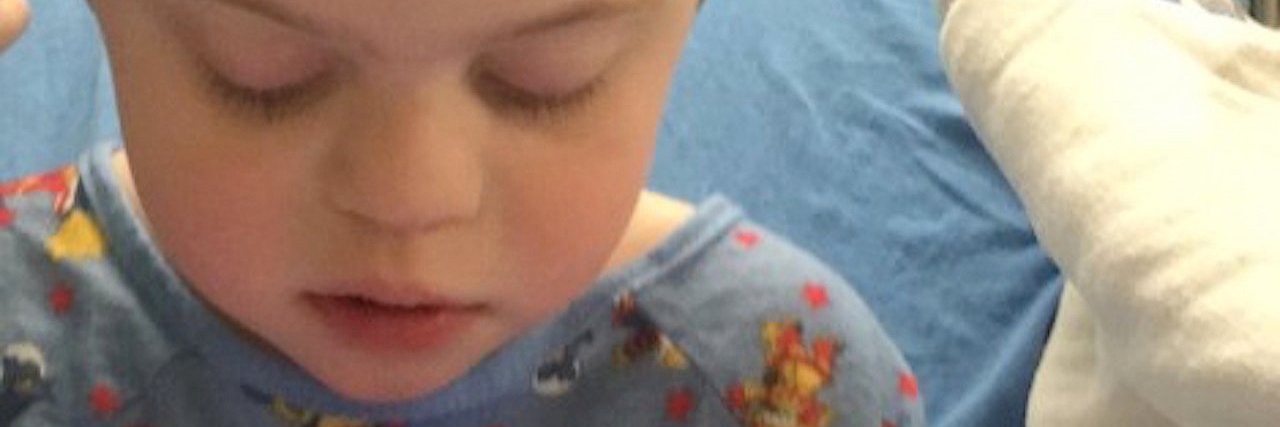Going to the hospital for surgery, no matter how minor the procedure, is a scary experience for anyone. I imagine it’s very scary for my 5-year old son, Evan, who has Down syndrome.
Though he’s had a number of surgeries, it’s not still part of his “normal” routine. As parents, my husband and I explain to him what’s going to happen, but we can’t know just how much he understands. We still tell him, though, because sometimes he understands far more than you think he does.
Still, I can’t imagine what it’s like for him to be wheeled down an unfamiliar hall and into an operating room, without Mommy and Daddy, in the care of strangers in attire that looks unusual. But Evan is brave and strong.
Evan’s surgeries are even scarier for my husband and me because we know that after procedures, Evan has respiratory reactions to anesthesia. We’ve had discussions at the pre-surgery consults. We’ve reminded the teams of his reactions each and every time he has surgery. There have been times when the anesthesia teams have pre-medicated our son with steroids and times they have not. One time when Evan was not pre-medicated, our outpatient visit turned into an overnight stay. So for me, the thought of anesthesia and my son is scary.
In March of this year, we had the best surgery and anesthesia experience for our son at the Children’s Hospital of Philadelphia because of you, and I am sad to say I don’t even remember your name.
Evan has a heart defect, so instead of having ear tubes placed in an outpatient center, his are done at the hospital under anesthesia. On the day of his procedure, we went to the hospital early, checked in and Evan played until it was time for all the pre-surgery checks. His vitals were taken, and the process was explained to us by the nurse and then the doctor. Finally, just before Evan’s surgery, you entered the room and told us you were going to be his anesthesiologist.
You were the one who worried me most because I know you had the power to make our experience a great one or a scary one. You began to explain what was going to happen, and I knew immediately you were going to deliver a different experience. You explained that you thought part of Evan’s reactions could have been due to the use of a tube down his throat versus a mask to deliver anesthesia. This time, the anesthesia was going to be delivered via mask. At that point, something shifted inside me, and I began to feel less tense. I knew you’d heard our concerns.
And then the experience got even better.
You turned to Evan. You introduced yourself. And you talked to him. You explained the procedure. It was in simple terms. You told him he was going to go for a ride on the bed. You told him you were going to put a mask on his face, and you were going to start counting backwards from 10. You said he would probably be asleep by the time you said eight. Evan listened to you and maintained eye contact. He participated in the exchange, though he didn’t speak. If I could guess, I bet that not much of the conversation meant much to him, but it meant the world to us. I’ll tell you why.
Evan is just 5 years old. He has Down syndrome. Many health professionals see him, and they talk about him without him. But as a parent, I want him to be part of the discussion because there are things he understands, even if he can’t express his understanding. Evan can show you where his heart is when you want to listen to it. He knows to take deep breaths when you listen to his lungs. If you ask him, he just may open his mouth and stick out his tongue when you want to look in his throat. He may let you look in his ears if he is feeling generous or may make the choice to sit in Mommy’s lap while you look. Someday, he will have a voice in his healthcare decisions, but in order for us to get to that place, Evan needs to start participating now.
You looked at Evan and didn’t see a child who didn’t have a voice or an understanding of his healthcare. You saw a patient, a participant. You took the time to explain the procedure to him when that explanation, even in simple terms, could exceed his comprehension. You looked at him as a capable little boy. You presumed competence.
There are so many settings where people see a 5-year old boy with Down syndrome and assume he’s not capable. It happens in schools, in restaurants, in fitness facilities and in healthcare, and parents of kids with Down syndrome and other disabilities often find themselves having to educate about the capabilities of our children.
I am certain you don’t think what you did that day was extraordinary. You simply explained a procedure to a patient. Your simple action, though, was all about dignity and respect, and you gave it in spades. Teach that to those behind you, please because it may make a difference for families on an otherwise very difficult day.
I cannot thank you enough.
Sincerely,
Julie Gerhart-Rothholz, Evan’s mom
The Mighty is asking the following: What is a part of your or a loved one’s disease, disability or mental illness that no one is aware of? Why is it time to start talking about it? If you’d like to participate, please check out our Submit a Story page for more about our submission guidelines.
Have you seen the first film with a national release to star a person with Down syndrome? Check out the film “Where Hope Grows” today!

